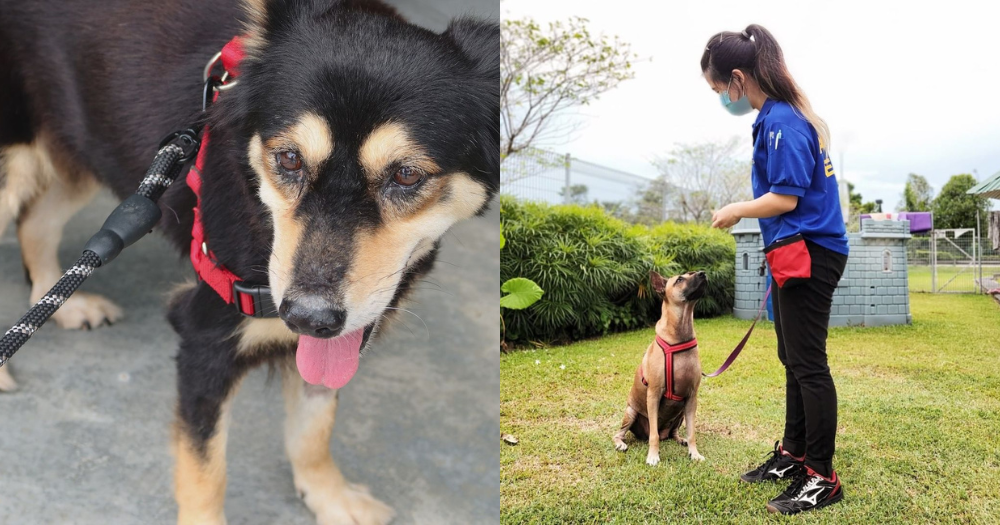New workgroup by AVS & SPCA to educate public on dog training & review use of devices like shock collars
The workgroup also aims to increase adoption of minimally aversive training approaches.

A new Dog Training Standards Workgroup has been created to raise the standards of the dog training industry in Singapore.
The workgroup will also aim to raise public awareness and the adoption of minimally aversive dog training, announced Senior Minister of State for National Development Tan Kiat How at a seminar on canine aggression on Aug. 22.
The Animal and Veterinary Service (AVS) under the National Parks Board (NParks) will be co-leading this together with local animal welfare group Society for the Prevention of Cruelty to Animals (SPCA).
The workgroup, which comprises 17 members from a diverse range of backgrounds, include dog trainers, veterinarians, animal welfare groups and representatives from working dog units.
The launch of this group comes at a time whereby licensed dog ownership has increased by 30 per cent over the past five years, Tan said in his opening address.
Shift in approaches to dog training
Central to the workgroup is promoting the education of a diverse range of dog training approaches.
For starters, the group seeks to raise awareness of the Least Intrusive, Minimally Aversive (LIMA) approach, as opposed to traditional, more "aversive" methods of dog training such as the use of training devices like shock, prong and electric collars.
The group will also study and review international standards and positions on the use of said training devices.
It will also develop plans and approaches for training standards, Codes of Welfare, and the regulation of the use of training devices.
Working with pet shops and e-commerce platforms
AVS is also benchmarking against dog training practices adopted in other countries.
Tan shared how the workgroup has also been looking at regulatory policies in places like Australia to distil what the best practices would look like for Singapore.
AVS stated that it will continue to gather insights from overseas on the enforcement of the use of training devices.
It has also started engaging pet shops and e-commerce platforms to discourage their sale and publish warnings through notices and advisories.
Findings from the workgroup will be shared when completed.
What is the LIMA approach?
LIMA emphasises on the importance of building a cooperative relationship with dogs, rather than relying on fear or punishment.
“By adopting positive training methods, owners can foster a deeper and more trusting relationship with their pets”, Tan shared.
Founder of Puppylove Dog Training, Angie Tan, is one of those who advocates for such an approach.
Speaking to Mothership, Tan recounted a case where a distrusting dog had improved over time with respectful training.
“You are looking at establishing a relationship through a cooperative approach, rather than a top down approach”, Tan said.
Lack of knowledge surrounding use of e-collars
While electric collars, which are widely and easily purchasable online, have garnered a bad reputation, there are situations whereby the utilisation of it could not just enhance safety, but also improve the relationship between dogs and their owners, shared head trainer of social enterprise Bark of Duty Christine Ho.
Ho told Mothership that the issue lies with the lack of knowledge surrounding the proper adoption of such collars.
She shared how technology has aided in improving electric collars and that “how e-collars can be used are a lot more versatile [today]” as opposed to traditional means.
“E-collars now have varying levels of stimulation for training”, Ho shared, citing how it is of utmost importance for handlers to understand the different levels of stimulation and what is suitable for their dog.
Education is key
SPCA has long advocated for the regulation or ban of shock collars.
In response to NParks' previous announcement that it would introduce guidelines on raising awareness of the risk of using such devices instead, SPCA said in a Facebook post that it was "deeply dismayed by this decision".
However, Executive Director of SPCA Aarthi Sankar also acknowledged that there is a need to consider those who do use devices like shock collars, instead of letting such usage "go under the radar", which would not bode well in the long term.In response to the recent cases of dog bites and aggression, Sankar also told Mothership:
“Human welfare and animal welfare are intrinsically linked. [...] You cannot talk about how to train animals without thinking about public safety. And at the same time, you need to be able to equip the human with the right welfare, the right amount of education, so that they can do better for the animals as well."
Educating the public on the risks on using these devices "help people to make more informed choices about their training methods", AVS stated in a press release.
Sankar echoed similar sentiments, saying that education is “one of the key strategies that [the workgroup can] all agree on unanimously”.
"Human welfare, animal welfare has to improve together. It cannot be seen as two separate things. And choosing to use a shock collar is not a choice that, you know, prioritises human welfare. You should never look at the choices as being mutually exclusive," Sankar concluded.
Top photo from SPCA/Instagram
MORE STORIES




















